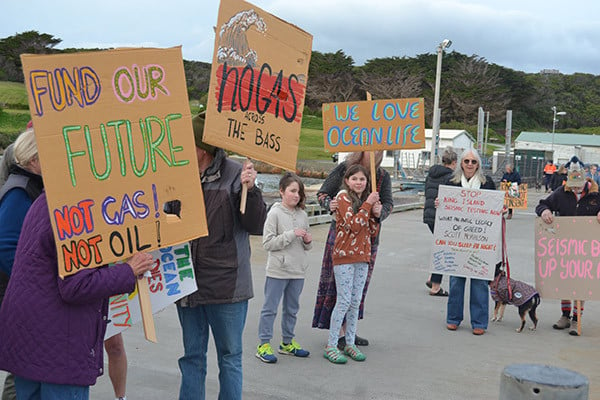Media Releases - 28 August 2021
King Island Residents Tell US Oil & Gas Giant ConocoPhillips: No Seismic Blasting!
King Island community holds ‘paddle out’ to protest seismic blasting
Probably the largest public protest in King Island’s history
Island fears fishery, rock lobsters, marine environment & King Island brand will be harmed
In one of the largest ever public gatherings in modern times, King Island residents have held a ‘paddle out’ to oppose US oil and gas giant ConocoPhillips coming into their waters to seismic blast for fossil fuel.
ConocoPhillips has just started seismic blasting off the west coast of King Island, north west of lutruwita (Tasmania) in Bass Strait. The island has a population of about 1,700 people.
The seismic blasting uses repeated sonic booms, emitted from six ‘noodles’ dragged behind the ship for the next 40-50 days. At 212db, the deafening sound is almost certain to devastate the island’s prized $22m rock lobster fishery, as well as the wider marine environment. This is in line with findings provided by the Tasmanian Government, which found the impacts on invertebrates would be “permanent”.
The paddle out on Thursday saw 200 local people, fishers, surfers on the water and pedestrians congregate at the harbour at the capital Currie with placards and banners.

“King Islanders have made clear their opposition to ConocoPhillips raiding their waters without their permission and against their will,” said Tom Allen for the Wilderness Society Tasmania.
"ConocoPhilips' business model and the continued expansion and extraction of oil and gas is illegitimate. The King Island community, whose public marine waters ConocoPhilips is raiding and degrading, doesn't want seismic blasting. ConocoPhilips carries no social licence to operate. It should return to the US and rapidly decarbonise.
“The King Island fishing industry is being hammered by the impacts of the Covid downturn, China import bans and now seismic blasting. State and Commonwealth governments are nowhere to be seen,” said Mr Allen.
Ally King, of Surfrider Tasmania, said: “The impacts around seismic testing have not been adequately identified. There is a clear gap between the science and the regulation used by government decision makers. Until this gap is closed the precautionary principle should be applied - ie, assume it’s harmful unless you can prove it’s safe”.
“At only 26, I have witnessed the degradation of our oceans unfold. The ocean is our greatest resource. Speculative and destructive exploration for oil and gas in 2021 is nonsense and completely unacceptable. We must stand up, and we must do better, not only for our environment and marine life but for the future prosperity and survival of the human race, who depend upon it. King Island is an example of a community that depends on fishing that is currently having the ecosystems it relied on destroyed by oil and gas corporations. The Commonwealth Government is happy for this to happen,” said Ms King.
In ConocoPhillips’ dive regulations - rushed out earlier this week - it refers to 140db seismic testing levels - but the company has since confirmed that the blasting will be conducted at 212db. (The Saturn V rocket launch was 204db and the Soviet hydrogen bomb ‘Tsar Bomba’ was 224dB - and sound travels further underwater.)
The same diving regs say that "where diving and seismic activities occur within a distance of 30 km, a joint risk assessment should be conducted between both parties and a simultaneous operations (SIMOPS) plan developed" - this distance includes the King Island coastline - but no plan has been developed - yet people are in the water all the time, spearfishing, swimming, surfing and diving.
At a community meeting on Tuesday last week, a motion was unanimously passed that reads: “We agree that the King Island community has the right to decide on significant decisions that affect the island’s community, including the King Island lifestyle, the fishing industry and the future prosperity of the island.”
Last week, Beach Energy also just put in an application to seismic blast 74km to the east of king island.
“People on the island are unhappy with the lack of communication about the impacts this seismic surveying will have on their lives and livelihoods. The community don’t want this blasting to happen. There are spearfishers, divers, surfers and swimmers in the water all the time and yet it appears they could be at risk if they enter the water during the seismic testing period,” said Ms King.
In its ‘environmental plan’ Conocophillips’ admits “sound sensitive fauna, like whales, fish, seals and invertebrates (eg, rock lobsters and giant crabs) are identified as residing in or migrating through the survey area. There is potential for the [seismic testing survey] to impact this fauna”. But it claims the impacts are temporary, whereas Tasmanian Government scientists suggest the impacts are permanent.
Contacts
Ally King of Surfrider Tasmania on +61 488 400 791
Tom Allen, Wilderness Society Tasmania on 0434 614 323